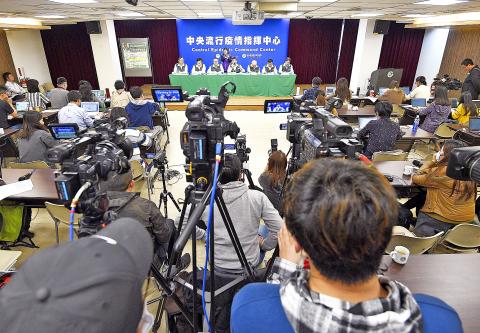The Central Epidemic Command Center yesterday raised the travel advisories for Japan and South Korea to a level 2 “alert” — “practice enhanced precautions” — after rapidly rising numbers of locally transmitted COVID-19 infections were reported.
Japan has 110 confirmed cases spread over 14 prefectures, while South Korea has 346 confirmed cases, the center said, adding that more than 70 percent of cases in both countries are suspected of being locally transmitted with an unknown source of infection, and clusters of healthcare-associated infections have been reported.
As the two countries are popular destinations among Taiwanese, the center has decided to elevate the travel advisories, Minister of Health and Welfare Chen Shih-chung (陳時中) said, adding that additional border controls might be imposed if the epidemic situations deteriorate.

Photo: Chen Chih-chu, Taipei Times
Travel to Japan or South Korea in the previous 30 days would also be flagged in the National Health Insurance (NHI) information of returning Taiwanese, said Chen, who heads the center.
Separately yesterday, Ministry of Foreign Affairs spokeswoman Joanne Ou (歐江安) said in a statement that Taiwan’s disease situation does not fulfill the definitions for community spread, adding that the ministry has fully explained the nation’s situation to the US.
Ou’s remarks came after the US Centers for Disease Control and Prevention (CDC) earlier this week listed Taiwan as one of many “destinations with apparent community spread” of COVID-19, prompting a request from the ministry on Thursday for the CDC to correct Taiwan’s status.
The US replied that it understands the nation’s concern and hopes that Taiwan will provide more information to facilitate its evaluation, Ou said yesterday.
As of press time last night, no new confirmed COVID-19 cases had been reported in Taiwan yesterday.
An investigation into people who came into contact with the nation’s 24th case — a woman in her 60s living in northern Taiwan who has not traveled abroad in two years — is still in progress, Chen said.
The center was originally worried about healthcare-associated infections, because the woman was not sent to an isolation ward when she was first diagnosed with pneumonia, but COVID-19 tests on 134 healthcare practitioners who had close contact with her were all negative, he said.
The center expanded the investigation to include 465 people who had close contact with the woman. Among the 181 people who have been tested, her granddaughter and daughter were on Friday confirmed as the nation’s 25th and 26th cases.
Regarding a contact investigation for the nation’s 19th confirmed case, a 61-year-old man who was the nation’s first COVID-19 fatality, Chen said that 256 people have been tested for the coronavirus.
Four people — the man’s relatives and the nation’s 20th to 23rd cases — tested positive, while all others had negative results, he said.
The center considers the cluster of cases related to the fatality “case closed,” he added.
Meanwhile, the National Health Insurance Administration announced that the age limit to buy masks for children with an NHI card has been increased from 12 to 13 years.
Starting yesterday, children’s masks can be purchased at pharmacies for children born in 2007 and later, it said.
Additional reporting by Lin Chia-nan

AGING: As of last month, people aged 65 or older accounted for 20.06 percent of the total population and the number of couples who got married fell by 18,685 from 2024 Taiwan has surpassed South Korea as the country least willing to have children, with an annual crude birthrate of 4.62 per 1,000 people, Ministry of the Interior data showed yesterday. The nation was previously ranked the second-lowest country in terms of total fertility rate, or the average number of children a woman has in her lifetime. However, South Korea’s fertility rate began to recover from 2023, with total fertility rate rising from 0.72 and estimated to reach 0.82 to 0.85 by last year, and the crude birthrate projected at 6.7 per 1,000 people. Japan’s crude birthrate was projected to fall below six,

Conflict with Taiwan could leave China with “massive economic disruption, catastrophic military losses, significant social unrest, and devastating sanctions,” a US think tank said in a report released on Monday. The German Marshall Fund released a report titled If China Attacks Taiwan: The Consequences for China of “Minor Conflict” and “Major War” Scenarios. The report details the “massive” economic, military, social and international costs to China in the event of a minor conflict or major war with Taiwan, estimating that the Chinese People’s Liberation Army (PLA) could sustain losses of more than half of its active-duty ground forces, including 100,000 troops. Understanding Chinese

US President Donald Trump in an interview with the New York Times published on Thursday said that “it’s up to” Chinese President Xi Jinping (習近平) what China does on Taiwan, but that he would be “very unhappy” with a change in the “status quo.” “He [Xi] considers it to be a part of China, and that’s up to him what he’s going to be doing, but I’ve expressed to him that I would be very unhappy if he did that, and I don’t think he’ll do that. I hope he doesn’t do that,” Trump said. Trump made the comments in the context

SELF-DEFENSE: Tokyo has accelerated its spending goal and its defense minister said the nation needs to discuss whether it should develop nuclear-powered submarines China is ramping up objections to what it sees as Japan’s desire to acquire nuclear weapons, despite Tokyo’s longstanding renunciation of such arms, deepening another fissure in the two neighbors’ increasingly tense ties. In what appears to be a concerted effort, China’s foreign and defense ministries issued statements on Thursday condemning alleged remilitarism efforts by Tokyo. The remarks came as two of the country’s top think tanks jointly issued a 29-page report framing actions by “right-wing forces” in Japan as posing a “serious threat” to world peace. While that report did not define “right-wing forces,” the Chinese Ministry of Foreign Affairs was